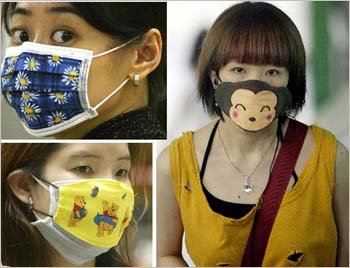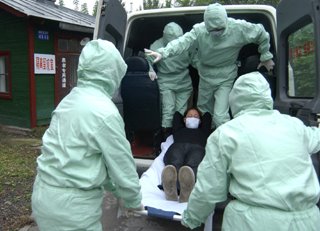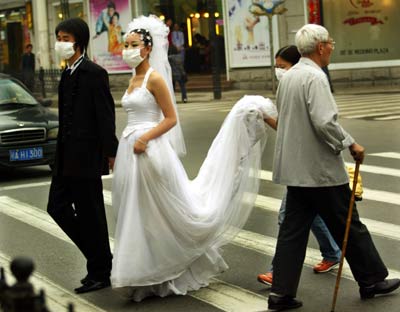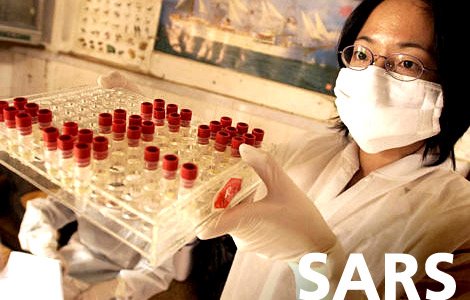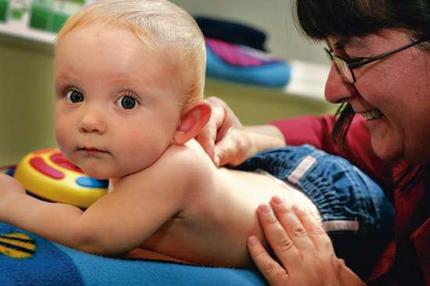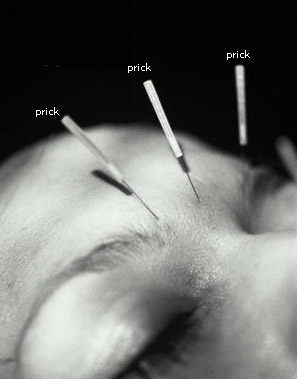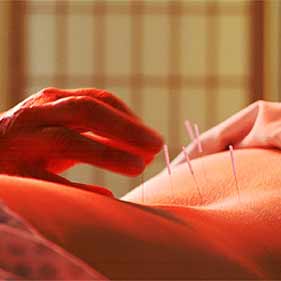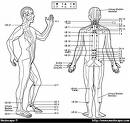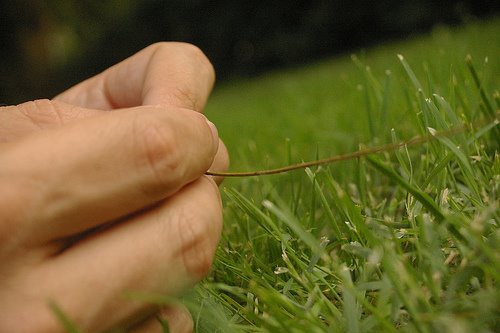 Dr. Mustafa was the only classmate of mine in high school that took up western medicine. He was a specialist of oncology. We were very good friends but then all of us always joked that it’d be better not to go see him for his professional help. He was always around for school reunion and his income was too high to imagine. He’d always help those who were in financial straits and sometimes he paid when we got together for dinners. He was always giving and generous; however, he lived a simple life. Whenever he came for gathering, he took buses. And then there came the subway, of course he picked up the subway. And he never ate sumptuous meals and too much either. My perception was that he disliked over comfortable lifestyle.
Dr. Mustafa was the only classmate of mine in high school that took up western medicine. He was a specialist of oncology. We were very good friends but then all of us always joked that it’d be better not to go see him for his professional help. He was always around for school reunion and his income was too high to imagine. He’d always help those who were in financial straits and sometimes he paid when we got together for dinners. He was always giving and generous; however, he lived a simple life. Whenever he came for gathering, he took buses. And then there came the subway, of course he picked up the subway. And he never ate sumptuous meals and too much either. My perception was that he disliked over comfortable lifestyle. We were about 62 years old. We all talked about retirement but none of us really did so. Four months ago I was told by a common friend that he had retired and the hospital held a party for his contribution. The atmosphere of the party was filled rather with sadness. I had no idea what went wrong and was about to call when I bumped into him at a bookstore. He was reading some detective stories when he saw me. He was pleasantly surprised to see me and ushered me to a nice café and told me some detective stories he had recently read. I enjoyed the stories and I couldn’t help but noticed he’d lost weight.
Dr. Mustafa was a smart person. Of course he knew I’d noticed his skinny appearance. He told me without me prompting: He’d got cancer. He said he had a few more months to go. I was like struck by lightning. I didn’t ask him if he’d gotten any treatments for he was the specialist in this field. For sure he knew how to treat cancers. It was raining when we left the café. I got him a cab. That was the first time in my life I saw him in a cab, not buses.
A month later, he came to see me at my hometown. His son, a cancer specialist too, came with him by car. We went to the nearby farmland to see plane trees. All the plane trees were planted on the sides of roads and they made such a soothing silhouette. The white flowers were everywhere; it was such a miraculous view. He kept saying the trip was so worth it even though he seemed tired. He would never see this beautiful and magnificent view anymore, he said. Besides admiring the nature, he was also interested in the multimedia presentation. My research assistant showed him many interesting systems. Dr. Mustafa viewed them with great interest and asked many intelligent questions.
That was the last time I saw Dr. Mustafa. Later, he passed away. I was very puzzled; why did he go away so fast? With his expertise, he must have known his cancer at early stages. And that the treatments he’d get must also be the highest standard. Why did he go so soon?
 We all got his obituary. The obituary politely rejected any flowers or contributions. There was a special request: Friends and family members were asked to get together at a designated point to go to his funeral. The obituary asked that no one drove to his funeral. At his funeral, I saw a large number of medical specialists. They all had serious and solemn faces. We all had one question in mind: With all these medical specialists in the same hospital he worked in, why he went so fast?
We all got his obituary. The obituary politely rejected any flowers or contributions. There was a special request: Friends and family members were asked to get together at a designated point to go to his funeral. The obituary asked that no one drove to his funeral. At his funeral, I saw a large number of medical specialists. They all had serious and solemn faces. We all had one question in mind: With all these medical specialists in the same hospital he worked in, why he went so fast?
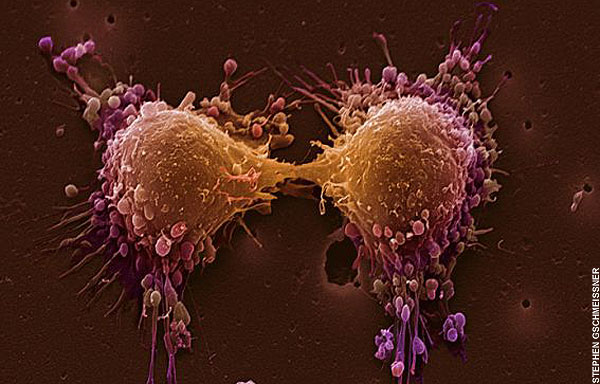 [Pic: Dividing cancer cells] At last the puzzle was revealed. Dr. Mustafa’s son told us a story none of us was aware of: Dr. Mustafa never received any treatments for his cancer. Why? His son showed us a video of Dr. Mustafa. In the video, Dr. Mustafa explained what cancerous cells are. We all believe that cancerous cells are the unhealthy cells. In fact, cancerous cells are the healthiest cells. They are the most active cells. The normal cells will mutate but there’s a limit to the mutation. Mutation of cancerous cells never ends. Endless mutation needs nutrition. However, there’s a limit to a person’s nutrition. The abundant number of cancerous cells will eventually suck all the nutrition from other normal cells.
[Pic: Dividing cancer cells] At last the puzzle was revealed. Dr. Mustafa’s son told us a story none of us was aware of: Dr. Mustafa never received any treatments for his cancer. Why? His son showed us a video of Dr. Mustafa. In the video, Dr. Mustafa explained what cancerous cells are. We all believe that cancerous cells are the unhealthy cells. In fact, cancerous cells are the healthiest cells. They are the most active cells. The normal cells will mutate but there’s a limit to the mutation. Mutation of cancerous cells never ends. Endless mutation needs nutrition. However, there’s a limit to a person’s nutrition. The abundant number of cancerous cells will eventually suck all the nutrition from other normal cells.
Dr. Mustafa believed many of us are cancerous cells. We are too healthy and we eat too much. We are rich and we consume a lot of energy. But there is only so much resource on the earth. The more we use, the more unfortunate other people become. Dr. Mustafa reminded us that if everyone on earth ate fishes from far seas just like we do, in one day we could finish all the fishes on earth. He asked this question again and again: If all the people on earth enjoyed life like we do, how long could the resources on earth last? To give an example, all the fossil fuels would be gone in 40 years.
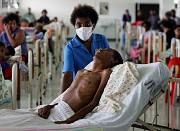 [Pic: Dying of Aids; Port Moresby's, Oct 28, 2005] His video also revealed the fact that there were 25 million people in
[Pic: Dying of Aids; Port Moresby's, Oct 28, 2005] His video also revealed the fact that there were 25 million people in
 Dr. Mustafa loved life. He loved his life. But he was not willing to see his life built upon the expenses of other people. He didn’t want to be too healthy, for being too healthy is like cancerous cells. At the end of the video, he mentioned his own illness. He said his illness was not possible to cure. Spending all the money on treatment and medicine he might live for another 3 to 4 years. But then in these 3 to 4 years he would have done very little. He didn’t want to spend so much medical resources just for another 3 to 4 years of his. He had very little ‘interest’ to receive treatments when there are so many Africans dying of AIDS. His son has also told us that Dr. Mustafa had donated ‘some’ money to a charity organization for the treatment of AIDS in
Dr. Mustafa loved life. He loved his life. But he was not willing to see his life built upon the expenses of other people. He didn’t want to be too healthy, for being too healthy is like cancerous cells. At the end of the video, he mentioned his own illness. He said his illness was not possible to cure. Spending all the money on treatment and medicine he might live for another 3 to 4 years. But then in these 3 to 4 years he would have done very little. He didn’t want to spend so much medical resources just for another 3 to 4 years of his. He had very little ‘interest’ to receive treatments when there are so many Africans dying of AIDS. His son has also told us that Dr. Mustafa had donated ‘some’ money to a charity organization for the treatment of AIDS in
If he had lived for another few years, he might have helped a few people. His refusal for treatment serves as an important life education for us all. The other day some classmates of ours got together for a reunion. No one complained about the simple vegetarian food. Everyone was happy about their existence of life. These days I only turn on the fan at home. The air conditional is on only when there are guests. My family and I live simpler and simpler life. It’s good enough to have eaten today.
 I live in an apartment. Sometimes I’d miss the big house I used to live. Those big compound and big front yard. And this idea has changed as well. If all the people in the world lived like that, there wouldn’t be any greens on earth. And all that we see would only be houses but no forest or trees. He was right: We can’t live too well; we shouldn’t be cancerous cells. We should leave the green mountains and fresh waters to our next generations, for others.
I live in an apartment. Sometimes I’d miss the big house I used to live. Those big compound and big front yard. And this idea has changed as well. If all the people in the world lived like that, there wouldn’t be any greens on earth. And all that we see would only be houses but no forest or trees. He was right: We can’t live too well; we shouldn’t be cancerous cells. We should leave the green mountains and fresh waters to our next generations, for others.
Dr. Mustafa has gone with grace, allowing others to live in grace.
